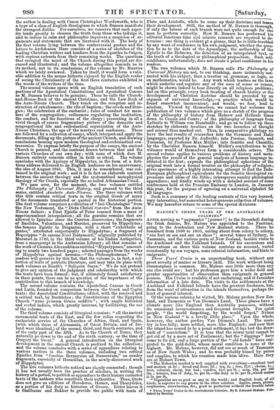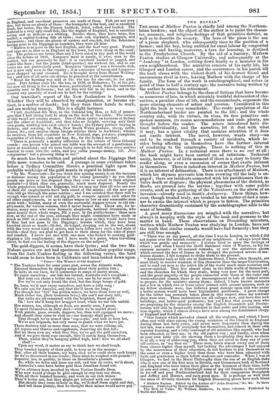MALONE'S THEEE YEARS IN THE AIISTRA.LIAN COLONIES. *
Arms serving as " paymaster " [purser?] to the Stromboli during the Irish famine, Mr. Malone was appointed to the FantOme, going to the Australian and New 2ealand station. There he remained from 1850 to 1853, Bailing about from colony to colony, "one foot on sea and one on shore "; several times at Sydney, in Tasmania, and the various ports of New Zealand, besides visits to the Auckland and the Falkland Islands. Of his excursions and observations on shore this volume contains an account, varied occasionally by sea voyages, some colonial information, and hints to emigrants.
Three Years' Cruise is an unpretending book, without any great novelty of matter or literary skill. The work without being edmmonplace is common. Mr. Malone sees little more than any one else could see ; but his profession gave him a wider field and greater opportunities of observation than emigrants in general possess. Ms Cruise is readable if not enchaining, and it furnishes information of a late date. The visits to the settlements at the Auckland and Falkland Islands have the greatest freshness, but, from the want of attraction in the islands themselves, perhaps the least of general interest. Of the various colonies he visited, Mr. Malone prefers New Zea- land, and Tasmania or Van Diemen's Land. These places have a climate more like England than Australia possesses, without its occasional inconveniences and frequent droughts. For quiet people, "the world forgetting, by the world forgot," Nelson in New Zealand "is a lovely little place." -Upon the whole, however, the author prefers Van Diemen's Land. The coun- try is less hilly, more settled, more like England; and now that the island has ceased to be a penal settlement, it has lost the draw- back of " convictism." It is true that the Moral taint cannot be got rid of by a mere act of Parliament; but the " diggings " have come to its aid, and a large portion of the "old hands" have emi- grated to the gold-fields, whose moral condition is none of the highest. Mr. Malone, however, did not see so much of Tasmania as of New South Wales ; and he was probably biased by prices and supplies, to which his vocation made him alive. Here they are at Hobart Town. "The Hobarton market is well supplied with everything—excellent beef and mutton at 3d. ; bread and flour, 3d. ; tea, 2s. ; rice, 21(1. ; cheese, ls.; beer, colonial, cheap, but bad; candles, 41d. per lb. ; soap, 28,. per 100 lbs. ; tobacco, free of duty, is. per lb.—the duty is 28. per lb.,which makes it 3s. per lb, " Vegetables are as good as any in the world; and English fruit, of all kinds, is superior to any grown in the other colonies. Apples, pears, plums, raspberries, strawberries, &c., grow to perfection without the trouble taken • Three Years' Cruise in the Australasian Colonies. By E. Edmond Malone. Pub- lished by Bentley. in England, and excellent preserves are made of them. Fish are not very fine, but there are plenty of them : the trumpeter is the best, and is excellent fresb, but better, like the Finnon haddock, dried, salted, and broiled. The flathead is a very ugly small fish, like the dogfish of England, but is excellent eating and as delicate as a whiting. Besides these, they have large, fine mullet, a capital-looking fish at table ; rock cod, mackerel, snappers, and barracouta ; and there are plenty of oysters and cra) fish, but the fishermen baying gone to the Diggings in numbers, they were all dear.
"Mutton is as good as the best English, and the beef very good. Poultry and eggs are as dear as in England in the town, but very cheap in the coun- try. The potatoes are better than any I have eaten in any part of the world since the failure of 1846. Kangaroo meat is rarely, if ever, seen in the market, but can generally be had : it is excellent hashed or jugged, and tastes like hare ; but the joints (hind-quarter) are without fat, and to our tastes are not particularly good. Kangaroo 'steamer' was a favourite dish, but is now only seen in the country; it is a mixture of bacon and kangaroo- meat chopped up and steamed. Ice is brought down from Mount Welling- ten; and ices of all sorts can always be procured at the confectioners.
"Wood for burning was sold at 14s. the ton for she-oak, 6s. for gum- wood. Port Arthur coals 14s. the ton, in 1850, at Hobarton ; 7s. at the pit; but now all firing is for a time dearer, particularly coals, from the enormous quantity sent to Melbourne ; but all this will fall to its level, and in the country any quantity of wood can be had for the cutting."
Our traveller's report of the New Zealanders is favourable. Whether they will be absorbed by amalgamation, or become ex- tinct, is a matter of doubt; but they turn their hands to work, and are making money. This is a slight instance.
"I left Auckland 5th May, in the Colonial brig Ilea, so full of passen- gers that I had (being last) to sleep on the deck of the cabin. The owners of this vessel are coining money. One of them carries on business at Sydney and the other at Auckland; and they take no freight, carrying only their own goods, working into each other's hands; • the Sydney partner buying in Sydney, and sending, by Moa, New South Wales produce, sheep, cattle, horses, &c., and surplus cheap foreign articles there to Auckland ; whence he receives, from his copartner in New Zealand, pigs, potatoes, pumpkins, vegetables of all kinds, corn and hay, &c., for the Sydney market.
"There is generally a motley collection in the cabins of these Colonial vessels : one person who joined our table was the servant of a gentleman I knew at Auckland; and we were lucky enough to be full when some natives wanted to come into the cabin and pay cabin passage-money, 121. Nice companions ! but a pleasing thing to see., "
So much has been written and printed about the Diggings that little more remains to be said. A. passage in some evidence taken before a Sydney Committee throws a practical light upon the probable workings of the gold mania in regard to labour.
"By Mr. Wentworth—Do you think this mining mania is on the increase or decrease among the population of the colony generally ? do you think people are more or lees disposed than they were to revert to their original pursuits ?—I think they are, generally, much more disposed. Nearly the whole population tried the Diggings, and we may say that all who are now at their old employments have been cured of the mania : all the new arri- vals will go through the same routine ; and I am satisfied that there will be enough who cannot or will not dig gold, to compete against each other for all other employments, so as to reduce wages as low as any reasonable man could wish; besides, many of even the successful diggers return to old em- ployments, for various reasons, that I never looked for. There are, for in- stance, many men who were formerly shepherds, habitual drunkards who spent nearly their whole wages, 20/. a year, in the public-house : these men now, at the end of the year, although they might sometimes have made as much as 100/. in a month, find themselves as poor as they would have been if they had not gone to the Diggings; besides which, they have been knocked about so much—ill-fed, ill-lodged, sleeping. out in the wet, drunk with the very worst kind of spirits, and have fallen into such a bad state of health—that they are glad to get back to their sheep for the sake of peace and comfort. I never yet met with one man who looked to making gold- digging a life employment ; and I have made it a point, when travelling about, to find out the feeling of the diggers on the subject."
The gold-diggers, it seems, have their lyrics ; and the two Mr. Malone quotes are not bad specimens of Australian popular songs. From the Anti-Yankee feeling in the following verses, the bard. would seem to have been in California and been looked down upon.
"Tune—' The Women of Old England.'
"The Yankees have for some years past, across the Atlantic wide, Enjoyed themselves by singing songs about their golden tide ; So now, in our turn, we'll commence in songs of merry strain, , To enjoy ourselves ; our tide has turned, Australia can't complain : Her sons can chant a better stave, yes, one by far more bold, For we've not only found the dust, but fine large lumps of gold. So, boys, we'll now enjoy ourselves, and have a jolly song : We care not for America, and that she'll know ere long ; For though her 'Cal' has golden mines, we have them here as well, Much richer too, (Bale Gammon boys,) she can't our story tell;
Our rocks are all cemented with the brightest, finest gold :
Oh! how she'll hang her braggart head, when we our tale unfold.
Her miners, too, i although so flash, are mostly seen, I guess, To sport themselves in dirty drab—while we n scarlet dress : With pistols, guns, swords, daggers, too, thus well equipped we move ; And should they come to visit us—our honesty shall prove, That though we're armed thus cap-a-pie,' and look so fiery hot, We're not brigands, but only mean to guard what we have got.
Those drabites told us more than once, that we were villains all All rogues and thieves and vagabonds, deserving six feet fall; But let them now say what they like, we've got the pelf ourselves, And if we give them rope enough, they'll surely hang themselves. Then, whilst they're hanging gibbet high, lord ! how we all shall chaff !— Upon my word, it makes us cry to think how we shall laugh.
They boasted largely of their gold, to keep us in the mumps : But, after all their bounce, my boys, they ne'er could show such lumps
As we've discovered in our creeks ; those must be weighed with pounds ! ! !
Superior, too, in quality, to those on Broadbrim's grounds. So, while we delve and loose our soil, and tear up rocks, we'll shout, Australia's sons have better gold than Jonathan found out.
We've °Mimes been insulted by these Yankee Doodle Does, Who now would p'rhaps be glad enough to step into our shoes, With all their boasted honesty, and work in our rich mines: They'd better not, lest they might get infected with our crimes. But should they come to help us dig, we'll chaff them night and day, And tell them plainly, that we thought their mines would never pay."



























 Previous page
Previous page